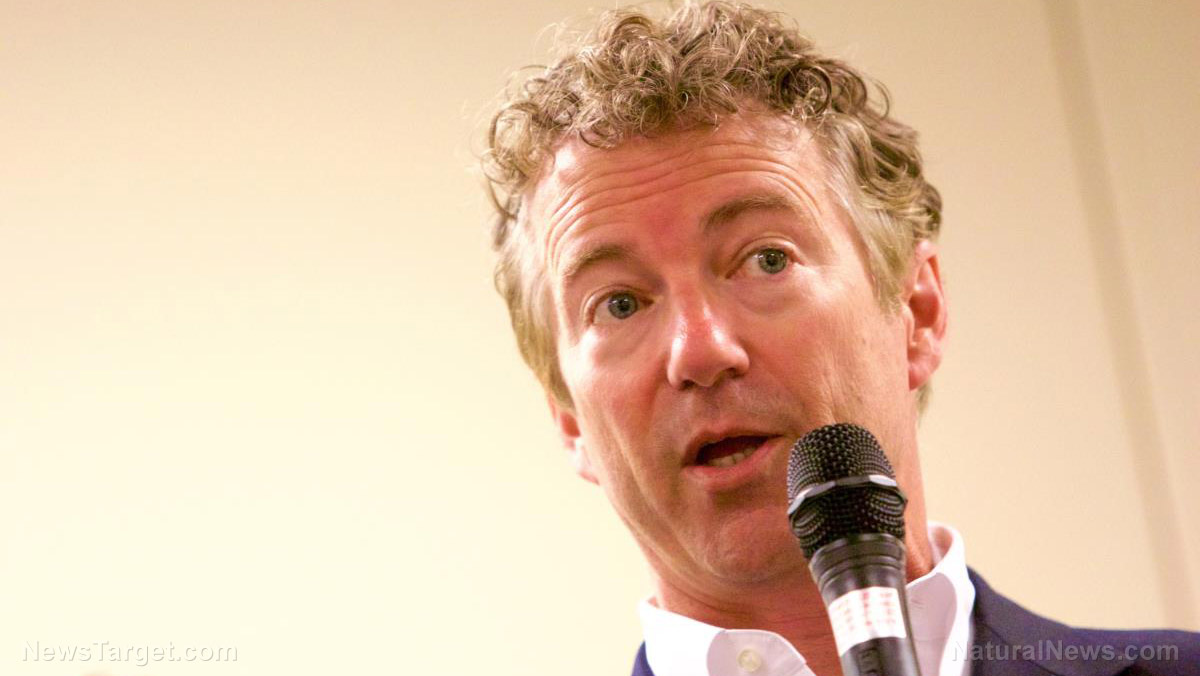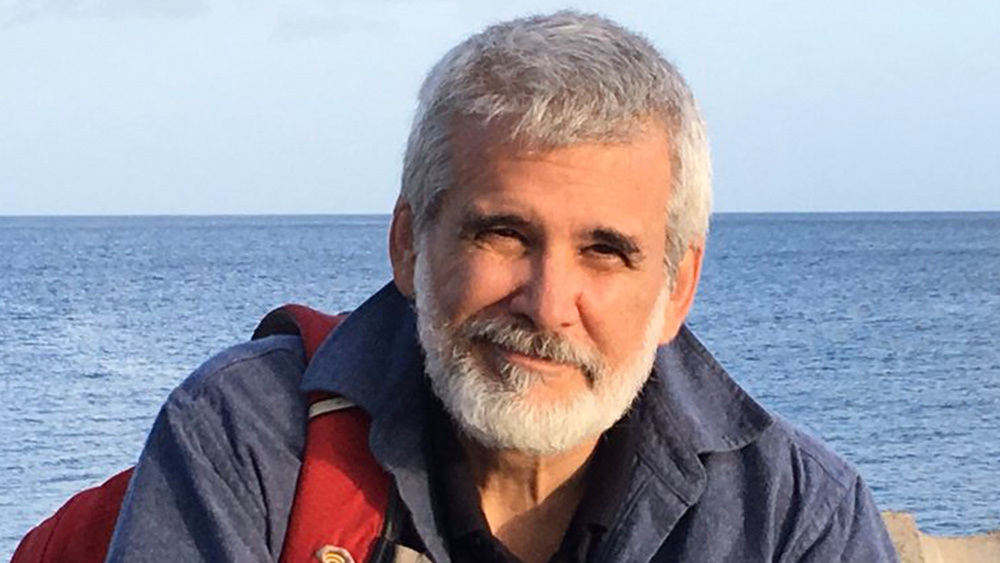With zero moral authority left, the globalist American empire is doomed to fail at home and abroad
03/31/2021 / By News Editors

The de-platforming of the President of the United States from its digital communications infrastructure marked a dark inflection point in our nation’s history.
(Article republished from Revolver.news)
Indeed, the rulers of the corrupt Globalist American Empire (GAE) have consolidated power to such a degree that they have little need left for even the pretense that the United States is a free country. That America’s corrupt ruling class are not even bothering to pretend like America is a free society anymore not only has dramatic consequences domestically, it has equally important implications globally. Accordingly, foreign governments have taken notice of the American ruling class’ dramatic arrogation of power in the wake of the events of January 6th.
The Polish prime minister came out with a forceful condemnation of the American censorship regime, coupled with support of a law that would make it illegal for social media companies to censor unlawful speech:
Polish government officials have denounced the deactivation of Donald Trump’s social media accounts, and said a draft law being readied in Poland will make it illegal for tech companies to take similar actions there.
“Algorithms or the owners of corporate giants should not decide which views are right and which are not,” wrote the prime minister, Mateusz Morawiecki, on Facebook earlier this week, without directly mentioning Trump. “There can be no consent to censorship.”
Morawiecki indirectly compared social media companies taking decisions to remove accounts with Poland’s experience during the communist era.
“Censorship of free speech, which is the domain of totalitarian and authoritarian regimes, is now returning in the form of a new, commercial mechanism to combat those who think differently,” he wrote. [The Guardian]
The President of Mexico issued a similarly strong statement condemning the American censorship regime:
“I don’t like anybody being censored or taking away from the the right to post a message on Twitter or Face(book). I don’t agree with that, I don’t accept that,” López Obrador said.
“How can you censor someone: ‘Let’s see, I, as the judge of the Holy Inquisition, will punish you because I think what you’re saying is harmful,'” López Obrador said in an extensive, unprompted discourse on the subject. “Where is the law, where is the regulation, what are the norms? This is an issue of government, this is not an issue for private companies.” [US News]
Even leaders who sparred with Trump have had a frigid reaction to the Big Tech-led purge of Donald Trump from American public life. Germany chancellor Angela Merkel’s difficulties with Trump created at least one viral photo, and her country is hardly a beacon of free speech compared to how America was just a few short years ago. But Merkel can clearly see the authoritarian blueprint that is being rolled out in the United States, and how quickly it can be taken worldwide. So when the news broke of Trump’s Twitter ban, Merkel loudly objected.
“The chancellor sees the complete closing down of the account of an elected president as problematic,” Steffen Seibert, her chief spokesman, said at a regular news conference in Berlin. Rights like the freedom of speech “can be interfered with, but by law and within the framework defined by the legislature — not according to a corporate decision.”
The German leader’s stance is echoed by the French government. Junior Minister for European Union Affairs Clement Beaune said he was “shocked” to see a private company make such an important decision. “This should be decided by citizens, not by a CEO,” he told Bloomberg TV on Monday. “There needs to be public regulation of big online platforms.” Finance Minister Bruno Le Maire earlier said that the state should be responsible for regulations, rather than “the digital oligarchy,” and called big tech “one of the threats” to democracy. [Bloomberg]
This wasn’t the first time America’s brand of exerting control bothered Merkel, who grew up in East Germany. As Glenn Greenwald recently noted, Merkel was also furious when Edward Snowden’s whistleblowing led to the revelation the NSA was spying on her phone calls:
"German Chancellor Angela Merkel blasted Twitter’s decision to ban U.S. President Donald Trump.
'The right to freedom of opinion is of fundamental importance,' Steffen Seibert, Merkel’s chief spokesman, told reporters in Berlin on Monday." https://t.co/1f8X98ZJIY
— Glenn Greenwald (@ggreenwald) January 11, 2021
Many more foreign leaders have followed-suit in condemnation of the American censorship regime, including leaders from Brazil, Finland, Russia, China, New Zealand, Australia, India, and more. Revolver published a comprehensive, up-to-date list here.
What are we to make of this? At first, this might seem like the height of hypocrisy, especially given some of the nations involved. The German Chancellor Merkel is after all hardly in a position to lecture anyone on free speech matters, given that speech that offends the government is actually illegal in Germany.
Perhaps the issue then isn’t censorship, but rather who is doing the censorship. Several of the foreign leaders complained specifically that it was private Silicon Valley tech companies, rather than the state itself doing the censorship.
Recall the German statement:
Rights like the freedom of speech “can be interfered with, but by law and within the framework defined by the legislature — not according to a corporate decision.
and France’s similar statement“There needs to be public regulation of big online platforms.” Finance Minister Bruno Le Maire earlier said that the state should be responsible for regulations, rather than “the digital oligarchy,” and called big tech “one of the threats” to democracy
And so, on the one hand many international leaders seem to take issue with the fact that the deplatforming is being done by technically private companies rather than the government itself. The reality though is that, contrary to popular belief, Silicon Valley’s power does not represent some new and unprecedented threat to the power of the American state. Quite the contrary, Big Tech is essentially intertwined with and operates as an extension of the American state. The Atlantic put it best in a piece it ran on the loss of internet freedoms in America:
But the “extraordinary” measures we are seeing are not all that extraordinary. Powerful forces were pushing toward greater censorship and surveillance of digital networks long before the coronavirus jumped out of the wet markets in Wuhan, China, and they will continue to do so once the crisis passes. The practices that American tech platforms have undertaken during the pandemic represent not a break from prior developments, but an acceleration of them.
As surprising as it may sound, digital surveillance and speech control in the United States already show many similarities to what one finds in authoritarian states such as China. Constitutional and cultural differences mean that the private sector, rather than the federal and state governments, currently takes the lead in these practices, which further values and address threats different from those in China. But the trend toward greater surveillance and speech control here, and toward the growing involvement of government, is undeniable and likely inexorable. [The Atlantic]
Many American conservative commentators have incorrectly interpreted Big Tech’s exercise of power as an unhealthy usurpation of corporate power over the power of the state. Accordingly, some have called for the government to “reign in” the power of Big Tech. While there is some validity to it, this perspective largely makes the same mistake as the libertarian who assumes a sharp distinction between state power and private corporate power, defending the latter while working to limit the former. The truth of the matter is that at the highest levels, the state and the private sector are intimately intertwined and this is especially so when it comes to the Big Tech companies.
The de-platforming of the President of the United States doesn’t so much as mark the triumph of private corporate power over state power, as it does a triumph of the America’s globalist ruling class over its subjects. Similarly, from an international point of view, foreign governments are less concerned with the formality that the American ruling class happens to outsource its censorship to the private sector, than they are with the overall arrogation of power by the American regime and what that might portend for their own sovereignty.
Indeed, sovereignty is the key here to understanding the international response to America’s now overt censorship regime. Germany and other foreign nations could care less about a principled protection of free speech. What they do care about, however, is the American state, acting through their Silicon Valley proxies, having the ability to de-platform foreign leaders to advance its own power and geopolitical objectives.
While Germany and most of Continental Europe has functioned more or less as a vassal state under the thumb of American influence, Germany in particular has started squirming, as it were, indicating its intention to carve out more genuine sovereignty for itself in the 21st Century. One concrete flashpoint for this development is the controversy over the Nordstream 2 energy pipeline. Germany and Russia are working on a pipeline that, if completed, would reduce the leverage of the United States to dictate its terms to Europe. The entire constellation of “color revolution” institutions of the American national security state, from the State Department, to the Atlantic Council, to NATO, to its propaganda arm the National Endowment for Democracy have been barking about this non-stop:
"It is often argued that Nord Stream 2 is necessary for European energy security. The EU has enough pipelines and LNG terminals to import all the gas it needs without Nord Stream 2." https://t.co/YlVLiGmNvC
— Atlantic Council (@AtlanticCouncil) November 18, 2019
"Nord Stream 2 is not a European project. This project was not designed to serve Europeans. From conception to implementation, the project has stood in stark contradiction to Europe's interests." 114 experts call for a killing blow to Nord Stream 2. https://t.co/dyag6sVhM4
— Atlantic Council (@AtlanticCouncil) September 18, 2020
If the American ruling class is able to deplatform a sitting president of the United States in order to consolidate power, what is to prevent it from using its leverage over Silicon Valley to deplatform foreign leaders who don’t bend the knee on a wide range of issues? If Germany refuses to bend the knee to the American state, perhaps it would face a systematic deplatforming of its leaders in addition to financial sanctions imposed by the American regime in an effort to punish those involved in the production of the pipeline.
Another example of European nations squirming for increased independence of action with respect to the United States is the recent economic agreement with China.
BRUSSELS — The European Union embarked on a trade deal with China believing that engagement with Beijing was the best way to alter its behavior and make it a committed stakeholder in the international system. But that was seven years ago.
The timing — with a newly aggressive China seen as a rival to the United States and just weeks before Joseph R. Biden Jr. becomes president — has opened the European Union to questions and criticism, from analysts and particularly American officials, that perhaps the deal was a diplomatic and political error.
It was concluded in the midst of China’s crackdown on Hong Kong. and Xinjiang and accepts vague Chinese promises to stop the use of forced labor. It creates doubts about Europe’s willingness to heed Mr. Biden’s call to work with him on a joint strategy toward Beijing. And it has handed an important victory to China, where the deal was hailed as a great success for President Xi Jinping before the 100th anniversary of the Chinese Communist Party and confirmation of its power in the new world.“For the trans-Atlantic relationship, it’s a slap in the face,” said Philippe Le Corre, a China scholar affiliated with Harvard’s Kennedy School and the Carnegie Endowment — especially after the Europeans in mid-November called on the incoming Biden administration to work with Europe on a joint approach to China.
“It’s damaged the trans-Atlantic relationship already,” Mr. Le Corre said, before Mr. Biden even takes office and whether or not it is ultimately ratified by the European Parliament.
…
But Thomas Wright of the Brookings Institution said that damage had been done by European officials’ describing the deal as part of their pursuit of “strategic autonomy,” a policy pushed by President Emmanuel Macron of France that annoys many American policymakers. [New York Times]
Put simply, European leaders (and others) interpreted the ruling class of America’s willingness to take the dramatic step of de-platforming the sitting President of the USA from its own digital communications infrastructure as a threat to their own ability to pursue “strategic autonomy” from the US Regime, whether it be on energy policy with Russia or economic policy with China. This is the appropriate framework in which to understand the international condemnation of the US Regime’s censorship crackdown on President Trump (and its own citizens).
American patriots reading this might think that while it was wrong for the corrupt ruling class of the United States to deplatform the President and censor its citizens, it might actually make sense to deplatform foreign leaders or at least use that as leverage in order to advance the geopolitical goals of the American state. Others might question a conception of patriotism that roots for the very same corrupt globalist American regime whose CIA, FBI, DOJ targeted democratically elected Trump from day one, and whose security state has effectively declared 70+ million Trump supporters as de-facto or potential “domestic terrorists.”
In any case, the United States is simply not in a position to use Silicon Valley to bully the rest of the world into submission in the same way it bullies its own citizens. The international condemnation of the American regime’s censorship of its citizens and deplatforming of the President is not a signal that, for instance, Europe is more willing to submit to the imperious demands of the American state. Quite the contrary, Silicon Valley’s arrogation of power on behalf of the American state is likely to reinforce Europe commitment to “strategic autonomy” in relation to the United States.
One can see a similar dynamic at work with the United States’ leveraging of the US dollar’s status as a reserve currency to advance its geopolitical objectives:
Ever since the dollar cemented its role as the world’s dominant currency in the 1950s, it has been clear that America’s position as the sole financial superpower gives it extraordinary influence over other countries’ economic destinies. But it is only under President Donald Trump that America has used its powers routinely and to their full extent, by engaging in financial warfare. The results have been awe-inspiring and shocking. They have in turn prompted other countries to seek to break free of American financial hegemony. [The Economist]
In other words, America’s supercharged censorship regime will only hurt its prestige and influence globally, by incentivizing existing trends toward increased autonomy and independence from American digital and financial infrastructure.
Twitter’s recent decisions to ban the accounts of the Chinese embassy and Iran’s Ayatollah Khameini is a fascinating development in its own right, but also a vindication of Germany and other foreign nations’ concerns about the de-platforming of then sitting President of the United States Donald Trump.
China’s Foreign Ministry said on Thursday that it was confused by the move and that it was the embassy’s responsibility to call out disinformation and clarify the truth.
The Chinese Embassy account, @ChineseEmbinUS, posted a tweet this month that said that Uighur women had been emancipated and were no longer “baby-making machines”, citing a study reported by state-backed newspaper China Daily.
The tweet was removed by Twitter and replaced by a label stating that it was no longer available. Although Twitter hides tweets that violate its policies, it requires account owners to manually delete such posts. The Chinese embassy’s account has not posted any new tweets since Jan. 9.
…
Twitter’s suspension of the embassy’s account came a day after the Trump administration, in its final hours, accused China of committing genocide in Xinjiang, a finding endorsed by the incoming Biden administration.The Biden administration did not immediately respond to a request for comment on Twitter’s move.
Twitter is blocked in China but has been embraced by Chinese state media and diplomats, many of whom have taken to the platform to aggressively defend China’s positions in what has come to be known as “Wolf Warrior” diplomacy. [Reuters]
This move certainly is a point in favor of the view that, contrary to the “Beijing Biden” narrative embraced by many conservatives, Biden is more or less on board with the aggressive Neo-Cold War approach to China favored by the American national security complex. Furthermore, the China and Iran bans support the view that Big Tech operates more or less as an extension of the American national security state and exists to advance its objectives. Such a provocative and important claim deserve their own extensive treatment which would run outside the scope of this particular article.
It suffices for our purposes here to note that Twitter’s action against the Chinese and Iranian governments are instances of the American state using Silicon Valley to advance its geopolitical objectives. The deplatforming of America’s own sitting President by America’s ruling class was a particularly aggressive move that could signal that the American state would lean more on Silicon Valley deplatforming as an instrument of power domestically and geopolitically — hence the international backlash mentioned above.
America’s intensified censorship regime will end up damaging its global prestige and power in another, still more profound way. That is, it has substantially undermined if not entirely evaporated America’s “moral authority.” The significance of this cannot be overstated. By saying that America has relinquished its moral authority is not to say that America has always operated morally from an objective point of view. Rather, it means America has shed the ability to even selectively or cynically claim the moral high ground for geopolitical purposes. The presumption of goodwill, which America routinely enjoyed during and after the Cold War as a champion of liberal democracy, has entirely evaporated.
We already see the effect of America’s newly upgraded censorship regime, coupled with its crackdown on pro-Trump demonstrators, on America’s ability to project propaganda in favor of Hong Kong’s protestors. After the crackdown, China’s state-run Global Times published a condemnation of American “digital hegemony” and called for tech companies to respect national sovereignty online. In other words, China signaled to the world that it supports letting governments handle their own populations, while America might use big tech to interfere at any time.
America’s crackdown also gave a greenlight for other regimes to behave in a similar manner. In Uganda, President Yoweri Museveni shut down the country’s social media before his election to a sixth consecutive term. Twitter tried to complain, but it only received mockery. The company’s credibility to advocate online “openness” is completely destroyed.
Most recently, we see this dynamic playing out in Washington’s bungled attempt to address the ascendancy of the military over US backed, so-called “democracy” forces in Myanmar
America has lost all moral high ground to tell Myanmar anything while we just inaugurated a "President" with 25,000 National Guard troops as security occupying Washington DC.
Oh, and the troops were vetted to ensure political loyalty.
— Tom Norton For Congress (MI-03) (@ForNorton) February 1, 2021
The more the American Regime clamps down on its citizens domestically, the less ability it has to weaponize its alleged “moral high-ground” to advance its interests abroad. While such a decline in “moral authority” would be a problem for any regime, it is uniquely and perhaps even existentially so for the United States. More than any other country in history, the United States leans on its alleged moral superiority as an instrument of power. Terms like “human rights,” “equality,” “fair elections,” and “freedom of speech” are not simply ideals to aspire to. They are weapons often cynically deployed against target regimes that have resources America want. A country like China is more transparently transactional in its dealings with other nations — they will promise infrastructure in exchange for being able to mine for precious minerals in the Congo, without pretending the mining deal has something to do with “women’s rights” or “gay rights” and so forth.
This difference plays out domestically as well. In China, people tend to defer to state authority so long as the state is performing competently. There is no psychological need for the Chinese to think of their nation in “as a “free society” that respects “human rights.” For better or worse, things are different in America. Being a “free society” is just as must an essential part of American self-identity as being a “global superpower.” America’s decline from global superpower status and its transition from a nation that at least pretends to be a free society to a more transparent and overt totalitarianism are mutually reinforcing tendencies that could strain the very special preconditions for American patriotism as we know it.
Perhaps one of the most interesting challenges facing the American regime is how it can slow its geopolitical decline and maintain a viable form of patriotism, even as it transitions from a persuasion model of control that relies on at least a lip-service pretext to being a free-society to a coercion model that relies on pure force and intimidation, rather than the pretty lies that used to serve as at least public justifications for regime institutions and their behavior.
It is far from clear that the American regime can complete this transition without dire consequences with respect to its standing globally, and to its own citizens right here at home. Patriots of all stripes should not view this as a consolation prize, but as a great opportunity.
Read more at: Revolver.news and Globalism.news.
Tagged Under: America, Big Tech, Censorship, China, Collapse, corruption, First Amendment, Globalist American Empire, government, politics, propaganda, Silicon Valley, Tyranny
RECENT NEWS & ARTICLES
COPYRIGHT © 2017 PENSIONS NEWS




















